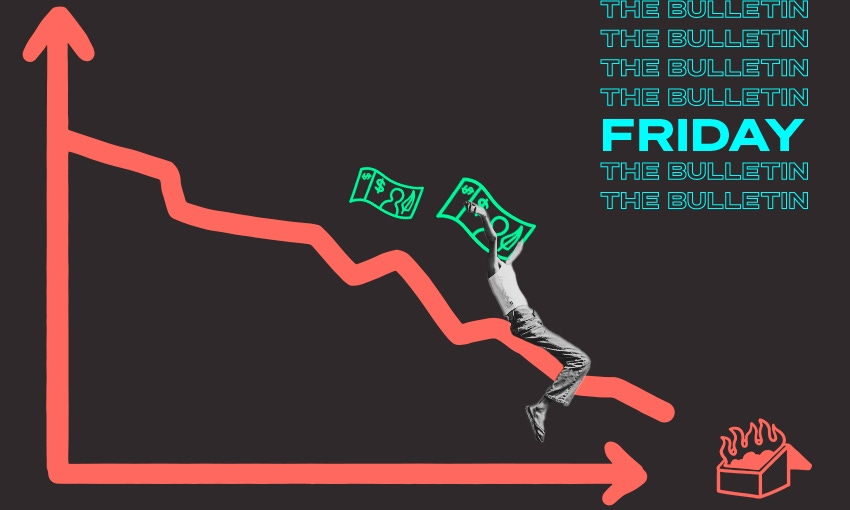The housing hangover begins
Consumer confidence is plunging and inflation is roaring, leaving many homeowners with big mortgages that could get bigger
Mōrena and welcome to The Bulletin for Friday, March 11, by Justin Giovannetti. Presented in partnership with Z Energy.
In today’s edition: Labour slips behind National in poll; Covid reporting on deaths to change; the RNZ-TVNZ merger; but first, the end of the housing boom.
The housing boom is over, but there’s no sign of affordability. (Image: Tina Tiller)
Unsustainable expectations about house price growth have now been dashed. Or: the boom is over.
The number of people who think this is a bad time to buy a house now outnumber the positive group by five-to-one. That’s the lowest level of home owner confidence in 26 years, Stuff reports. Last year’s overconfidence is now being replaced by a hangover, according to ASB, as mortgage rates climb, credit margins tighten and home buyers become increasingly stretched. Most people now expect mortgage rates to climb while economist at the four biggest banks all expect house prices to fall. Some large landlords are now warning they might make a significant loss on some property sales as prices have started to fall.
The signs are everywhere that the housing market is going into decline.
The average house price hasn’t grown this year, with values staying flat in January and falling in February. RNZ looked at the Quotable Value’s report released earlier this week and found every indicator pointing to a gradual decline. With the average home in Aotearoa now priced at over $1 million after two years of breakneck growth, most first home buyers have been priced out of the market and there’s little to celebrate. “There are less buyers out there now with the tightened credit rules and rising interest rates taking a number of first-home buyers and investors out of the market altogether,” QV’s general manager told the broadcaster. Westpac declared last month that the housing boom is over.
Is this actually the end of the great rise in house prices?
The boom may have ended semi-officially a fortnight ago but there’s been little celebration. And little to celebrate. Liam Dann wrote about his surprise at the lack of media commentary in the NZ Herald. Partly it might stem from a disbelief that this is actually happening. A week after he wrote his column, CoreLogic reported that the average house price in Auckland pushed past $1.5 million for the first time. That shows the great momentum of last year’s titanic house price increase, pushing into the first few months of this year. But it also reflects the fact that even a 10% drop this year, as ANZ now warns, won’t solve the housing crisis. Getting back to affordability will take a much larger drop in prices, or a large rise in incomes.
The wider economy now points to what is coming next.
There are now widespread warnings that the reserve bank may need to double interest rates by winter, sending a shock to consumers. As Interest writes, it could derail the economy with the much dreaded “hard landing”. Inflation was already on pace for the worst year in a generation and then Russia’s invasion of Ukraine sent prices at the pump spiralling. We could be reaching the point where businesses have no option but to start hiking wages and prices, fuelling more inflation. Dileepa Fonseka has written about the possible tough economic times ahead for Stuff.
A note from Toby Manhire, editor at large
On Wednesday March 2, the 23-day occupation of parliament came to an end amid terrible and unprecedented scenes on the doorstep of New Zealand’s house of representatives. It was a lot to keep up with – and a lot to get our collective heads around. At the Spinoff we were able to call on Justin Giovannetti, our political editor, to report from the press gallery, while Stewart Sowman Lund travelled to Wellington to run our news updates on location.
More than any protest action in New Zealand history, it needed to be understood not just on the ground, but in the digital undergrowth. Dylan Reeve dived into a teachable moment; I surveyed the key figureheads; Madeleine Chapman raised the alarm on a puff piece. Annabelle Lee-Mather, Justin and I discussed it all on the latest edition of the Gone By Lunchtime podcast (listen here).
The story is far from over, and we’ll continue to pull on the threads: from the global context and conspiracy theories to misinformation, disinformation and social media’s role; from the arguments around mandates to social cohesion.
As we continue to struggle against commercial headwinds, contributions from our members are more critical than ever – we simply couldn’t do this work without their support. If you value what we do, please consider becoming a member today. Donate now.
National has overtaken Labour in 1News poll.
For the first time since Covid-19 was declared a pandemic, Jacinda Ardern’s Labour party has fallen behind National. As 1News writes about its latest poll with Kantar, the flip follows the omicron wave and collapse of fortress NZ, the occupation at parliament, invasion of Ukraine and surging prices. Labour has fallen to its lowest result since 2017 at 37%, behind National’s 39%. Ardern’s preferred PM rating is the lowest since she became prime minister, while Christopher Luxon’s is the highest for a National leader since Sir Bill English was at the head of the party. Next year’s election could be very competitive.
Reporting of Covid deaths to change.
A question I’ve received from readers in recent weeks is to explain how Covid deaths are counted in New Zealand. Despite the country’s very low number of fatalities, there was a concern about overcounting. With an increase in deaths due to the omicron surge, the ministry of health is changing how deaths are reported. As Stuff explains, there will now be three numbers. There will be deaths where Covid was the clear reason (34); people had Covid but it clearly wasn’t the reason (2); and those with Covid but under investigation (48).
Thames-Coromandel’s mayor said she was waiting for Novavax.
But after the government made the jab available, Sandra Goudie said she’d rather remain unvaccinated. Why? She told RNZ she’d thought about it and “no thanks”. She’s barred from the council building. It’s an incredible interview where the mayor, who has spoken to anti-vax groups, said she’d prefer not to live in fear.
The Spinoff’s Covid data tracker has the latest figures.
Government adds $250 million to air cargo subsidies.
In a sign that international air travel to Aotearoa isn’t expected to recover this year, the government is extending its subsidies to airlines that carry cargo for another 12 months. As Stuff reports, taxpayers will have sent about $1 billion to airlines by next March to underwrite the cost of cargo flights from New Zealand. The scheme is expected to end once passenger numbers are closer to normal.
Duncan Grieve on the RNZ-TVNZ merger.
The government has confirmed that it wants to create a not-for-profit broadcasting giant that will likely dominate NZ media for years. The Spinoff’s Duncan Grieve looks at the plan and the challenge facing the new broadcaster. There are far more questions than answers. Will it recapture young audiences? Will it challenge commercial stations by skewing the market?
‘We can’t afford to give away a bread roll.’
The Instagram account of Al Brown’s Depot Eatery was hacked and over 4,000 entries have been made in a competition for non-existent $1,500 gift vouchers. Brown told Stuff that the hack originated in Indonesia and he doesn’t have enough money to “give away a bread roll”. Two days after the hack, including some sustained media attention in Aotearoa, the restaurant hasn’t been able to get Instagram to take down the post or reset the password. Instead of giving away money, nearly the entire restaurant sector is asking for government assistance.
Got some feedback about The Bulletin, or anything in the news? Get in touch with me at thebulletin@thespinoff.co.nz
Toby Manhire meets with Margie Apa and Riana Manuel, the women in charge of rebuilding New Zealand’s health system. Igor writes about being Russian and Ukrainian, but mostly heartbroken by the war. Josie Adams reports on the bike-based metaverse where you can meet an Olympian. Madeleine Chapman argues that panipopo is the best dessert. Chris Schulz speaks with the Auckland punk band who will open for the Foo Fighters and they are very excited, to put it mildly.
White Ferns win back-to-back in Hamilton.
The team has continued a dominating performance over India with a 62-run win at the Women’s Cricket World Cup in Hamilton. As RNZ reports, the team’s bowlers showed up and helped secure the win in the middle of a batter-friendly game. The White Ferns next plays Australia on Sunday in Wellington.













